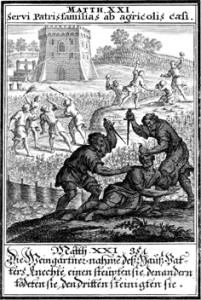Thoughts on Today’s Lessons for Oct. 5, 2014
First Reading: Exodus 20:1-4, 7-9, 12-20In recent readings we have followed the story of God’s people through the lives of the biblical patriarchs from Abraham to Joseph; then heard the story of Moses, with God’s help, leading Israel out of slavery in Egypt. Now on Mount Sinai in the desert comes a significant encounter: Establishing their identity and their hope, the people join in covenant with God, accepting the commandments that will guide their lives and ensure their righteousness in relationship with God and others.
First Reading (Track 2): Isaiah 5:1-7
When Jesus blessed bread and wine at the Last Supper, he was honoring a Jewish Passover tradition that goes back to ancient times. It’s no wonder, then, that the bible is full of parables involving wine, the fruit of the vine, and the vineyards from which it comes. Isaiah tells of God planting a vineyard, caring for it with love. But the harvest yielded “wild” grapes – in the original Hebrew, “stinking, worthless, sour” grapes. What happened? The vines represent the people, who disappointed God by failing to be just and righteous, not loving others as themselves.
Psalm: Psalm 19
All the heavens sing of God’s glory. All the skies reveal the work of God’s hand! This triumphant Psalm sings of the beauty of God’s creation. And then the theme turns, and we sing similar praise for the commandments, God’s law. True, just and righteous, God’s teaching stands above all earthly creation; sweeter than honey, more precious than gold.
Psalm (Track 2): Psalm 80:7-14
This poetic Psalm echoes Isaiah’s parable of the vineyard, but it adds a noteworthy twist: In Isaiah’s vision, God is disappointed by the sour fruit and decides to demolish the vineyard, tearing down its wall and hedge and commanding a drought to make it a waste. Our Psalm, on the other hand, calls on God’s compassion and remembers God’s grace in leading Israel to freedom and making it a nation. With the Psalmist we ask for another chance, calling on God to preserve the bountiful vines that God had planted.
Second Reading: Philippians 3:4b-14
Paul proclaims his stature as a devout Jew and a Pharisee, observant and righteous, and acknowledges that he once persecuted the infant church. But now. he tells the Philippians, everything has changed because he has faith in Christ. He will give up everything he has gained, in favor of living, suffering and dying with Jesus, in the hope of resurrection and life.
Gospel: Matthew 21:33-46
In today’s reading we find Jesus still arguing with the temple authorities. He tells another parable set in a vineyard. Using language quite similar to the Isaiah reading, Jesus tells of a vineyard whose tenant growers beat up and kill the slaves sent to collect the owner’s produce, and then even kill his own son. What will the owner do? Surely he will kill the evil tenants, the chief priests and Pharisees say. But Jesus brings a deeper message: If we hope to inherit the Kingdom of God, we should help produce its fruit.

